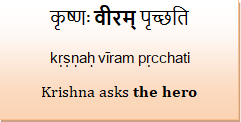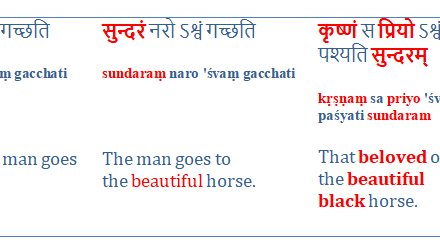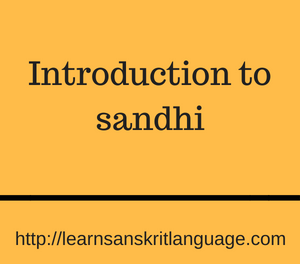Sanskrit Nouns are divided into 8 Nouns cases. They are; nominative, vocative, accusative, instrumental, dative, ablative, genitive and locative. Let us understand them deeply.
| Cases | Meaning |
|---|---|
| Nominative (case1) | In this case the noun names a particular thing which means that the noun takes the position of the subject in a sentence. For example, “man eats” |
| Accusative (case 2) | This case denotes”to/toward”. The noun in this case occupies the place of direct object. “they eat men” |
| Instrumental (case3) | This case denotes “by/through/by the means of/with”. The noun in this case appears as an instrument of the verb. “they grow by men” |
| Dative (case4) | This case denotes “to/for”. The noun in this case occupies the place of indirect object. “We give food to man”. man here is the indirect object whereas food is the direct object |
| Ablative (case5) | This case denotes “from/because of/due to”. Noun in this case indicates the origin or the instrument. “they come form man” or “form man everything else is generated” |
| Genitive (case6) | This case denotes “of” i.e. the noun in this case gives a sense of belonging to. “the cat of man” |
| Locative (case7) | This case denotes “in/on”. The noun in this case gives a sense of location. “virtues live in man” |
| Vocative (case8) | This case denotes “oh/hey” i.e. noun in this case indicates calling or invocation. “hey wake up” or “hey, come here” |
| Singular | Dual | Plural | |
|---|---|---|---|
| Case 1 (subject) | गजः gajaḥ | गजौ gajau | गजाः gajāḥ |
| Case 2 (object ) | गजम् gajam | गजौ gajau | गजान् gajān |
| Case 3 (with) | गजेन gajena | गजाभ्याम् gajābhyām | गजैः gajaiḥ |
| Case 4 (for) | गजाय gajāya | ||
| Case 5 (from) | गजात् gajāt | ||
| Case 6 (of) | गजस्य gajasya | गजयोः gajayoḥ | गजानाम् gajānām |
| Case 7 (in) | गजे gaje | ||
| Case 8 (address) | गज gaja | गजौ gajau | गजाः gajāḥ |
Case 1: “Subject”
It is the case in which the noun takes of the subject or it states something about the subject. For example, “man eats” in this example noun is a subject that is eating something. Similarly, in Sanskrit, we can say that:
“नरः गच्छति (the man goes)”
Forms of noun गज (elephant)
| Singular | Dual | Plural | |
| Subject | गजः gajaḥ |
गजौ gajau |
गजाः
gajāḥ
|
Case 2: “Object”
In this case, noun occupies the place of the direct object, which means hat noun here is stating something. For instance, “they eat man”. Here man is the direct object being eaten by the subject. In Sanskrit we can say that:
 Here the hero is the direct object.
Here the hero is the direct object.
कृष्णः वीरम् पृच्छति
kṛṣṇaḥ vīram pṛcchati
Krishna asks the hero
| Case 2 (object ) | गजम्
gajam
|
गजौ
gajau
|
गजान्
gajān
|
Case 3: “With”
In this case, noun appears to be the instrument of the verb or we can say that noun describes “means” of something. For instance; it is grown by men” noun here is followed by the verb. In Sanskrit we can say that;
गजेन गच्छामि
gajena gacchāmi
I go alongside (with) the elephant
| Case 3 (with) | गजेन
gajena
|
गजाभ्याम्
gajābhyām
|
गजैः
gajaiḥ
|
Case 4: “for”
In this case, the noun appears to be the indirect object in the sentence. This case also denotes purpose as in “I broke the coconut for some water,” and benefactor, as in “I broke the coconut for a friend.” In Sanskrit we can say:
वीरो नराय गच्छति
vīro narāya gacchati
The hero speaks for (the benefit of) the man.
| Case 4 (for) | गजाय
gajāya
|
Case 6: “of”
In this case, noun gives a sense of belonging. This case is an unusual one because it connects two nouns rather a noun to verb. For instance, “the cat or man” or “the behavior of man”
In Sanskrit, we can say that
गजानां वनं गच्छन्ति
gajānāṃ vanaṃ gacchanti
They go to the forest of the
In another sense case, 6 also refer to” having something” or “possessing something”
वीरस्य कृष्णो ऽश्वः (भवति)
vīrasya kṛṣṇo ‘śvaḥ (bhavati)
vīrasya kṛṣṇo ‘śvaḥ (bhavati)
| Case 6 (of) | गजस्य gajasya |
गजयोः gajayoḥ |
गजानाम् gajānām |
Case 7: “in”
Case 7 denotes location which in English is “in” and “on” in Sanskrit we can say that;
There also precise examples regarding the context of the sentence. For instance,
क्षेत्रे कृष्णेन सह वीरा नन्दन्ति
kṣetre kṛṣṇena saha vīrā nandanti
In the field, the heroes, with Krishna, rejoiced.
स मरणे मन्यते
sa maraṇe manyate
He thinks in (the context of) death
Case 8: “of
in this case, the noun is directly concerned with the person or with the subject of the subject. It is similar to the English word “you” in Sanskrit we can say that;
पुत्र त्वं नरः
putra tvaṃ naraḥ
Son, you are a man
| Case 8 (address) | गज
gaja
|
गजौ
gajau
|
गजाः
gajāḥ
|












